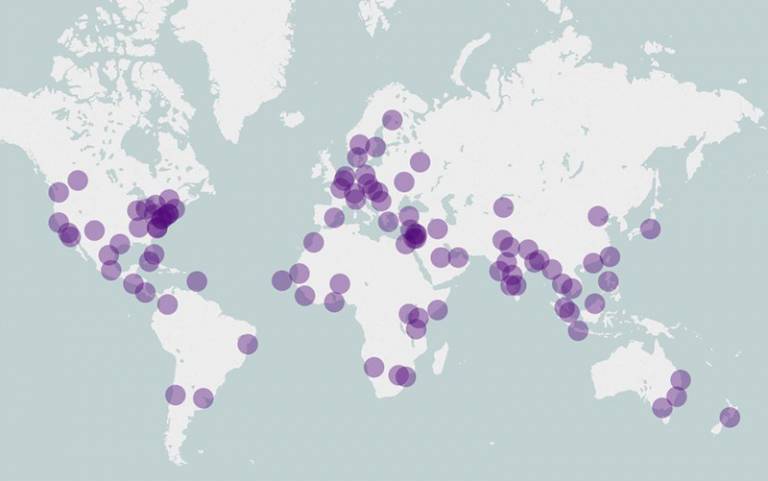Global Engagement Funds 2017: cultivating global students
26 July 2017
Winners of the 2017/18 Global Engagement Funds have been revealed, helping further UCL's global collaborations.

The winners of the 2017/18 Global Engagement Funds have been revealed this week.
This year the funds will support 167 UCL individuals working with partners in 62 countries.
More than 200 applications were received, spread across all UCL faculties, marking an 11% increase in the total number of proposed projects.
Of the 128 successful applications, 53 were led by early-career researchers (41%).
The funded projects strongly reflect the ethos of UCL’s Global Engagement Strategy.
Professor Gudrun Moore and Dr Karen Edge, joint UCL Pro-Vice-Provost (International), welcomed the appetite for global collaboration.
Gudrun said: "It's great to see the increase in applications, especially from early-career researchers. In the first two years, we’ve seen how even a small amount of funding (usually less than £2,000) has already led to international co-authored publications and external research funding."
Karen added: "From the first round of GEF funding, nine projects have successfully gained external funding worth over £2.1m. We can’t wait to see what this year’s recipients achieve.”
Since the Global Engagement Funds began, £500,000 has been distributed to support over 300 UCL academics across 75 departments, collaborating with over 200 partners in over 60 countries worldwide.
Here we explore how a couple of the latest recipients will use their projects to help prepare students for global lives and careers.
Human Dignity and the ECtHR
Dr Nina Lueck (UCL Laws) is using her award to organise a workshop and an interactive staff-student seminar in collaboration with Dr Pavel Bures from Palacky University Olomouc, Czech Republic.
The workshop will focus on the concept of human dignity, where students will discuss how this extra-legal concept is framed and what impact it has on human rights adjudication before European Court of Human Rights (ECtHR).
The seminar will deal with the notion of evolutive interpretation, where the key question will be whether the concept of human dignity might or might not serve as a limit for evolutive interpretation.
Dr Lueck and Dr Bures aim to analyse how students deal with the combination of an extra-legal phenomenon and legal aspects.
Commenting on the broader outcomes of the project, Dr Lueck said: "The activities involve both staff and students in a very active learning process, and contribute to UCL’s strategy to engage students as partners in research-led teaching and learning within the Connected Curriculum and the ChangeMakers Initiative."
Dr Lueck and Dr Bures plan to try out the same concept within the Palacky University Olomouc law school’s Master in International and European Law.
People-centred Urban Design
Following successful Global Engagement-funded participation in the "Co-creation for city-wide upgrading in Yangon" workshop in 2016, UCL Bartlett's Dr Camillo Boano and Dr Giovanna Astolfo will be using their award to build on the outcomes of this activity.
Dr Boano and Dr Astolfo, in collaboration with colleagues from Yangon Technological University (YTU) Myanmar, Architects of Myanmar Association and Women for The World, will organise a two-day training event open to graduate students.
Dr Boano said: “The aim is to support the local institutions in building the capacity of young professionals, capitalising on the long-term expertise of the UCL Bartlett Development Planning Unit (DPU), Asian Coalition of Housing Rights, and Community Architects Network. In the long run, the training could develop into a short course or evolve into a practical module.
"The training is mostly aimed at building the capacity of the young generation of architects of Myanmar, who will be working together with DPU students shortly after the training; better prepared local students will be able to engage fully with DPU students maximising the possibility to learn from each other."
Read more case studies of how last year's recipients used the funds.
Words: Jason Lewis
 Close
Close

